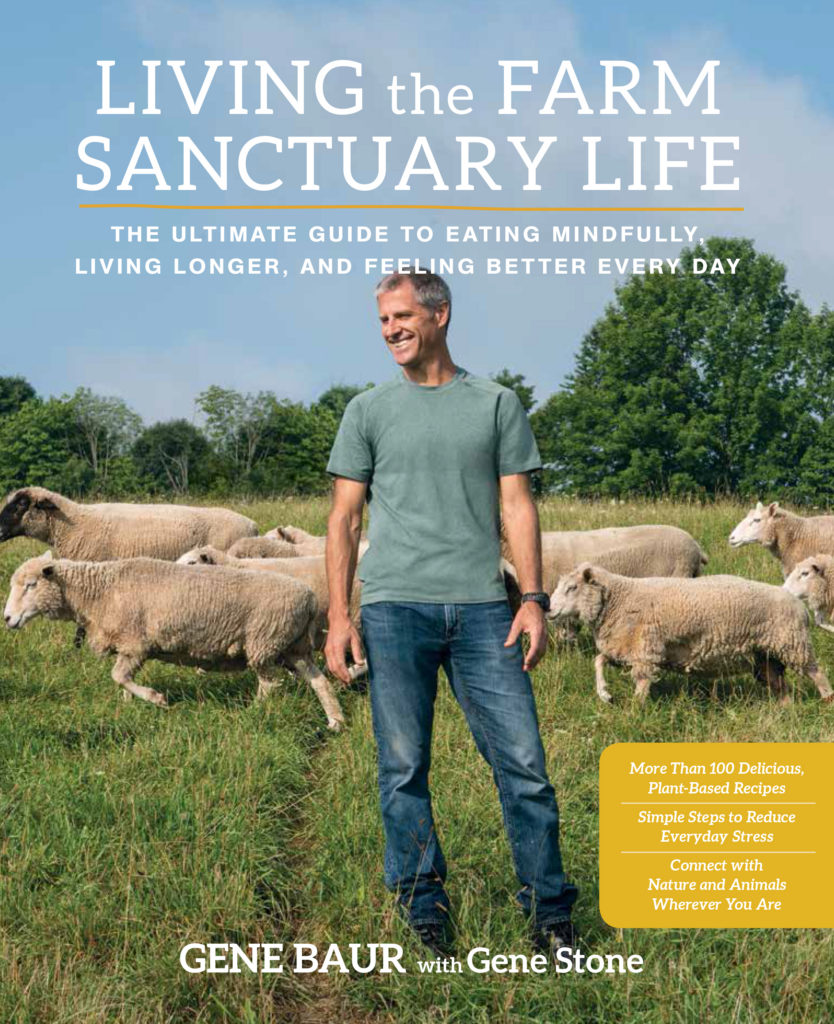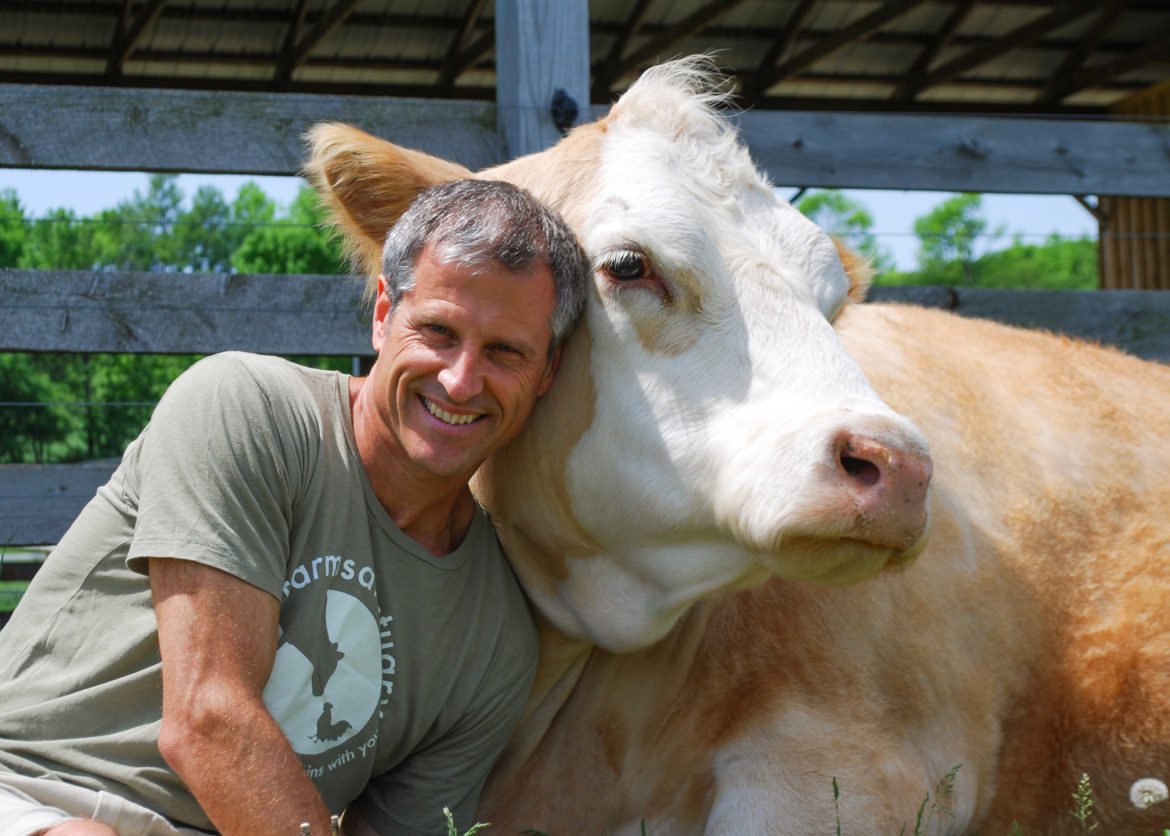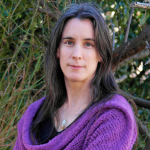Gene Baur, Farm Sanctuary President, author and activist, is interviewed on his successful book Living the Farm Sanctuary Life. In this definitive vegan and animal-friendly lifestyle guide, Gene explores the deeply transformative experience of learning to live compassionately and without harm to animals.
What is the Farm Sanctuary life?
The Farm Sanctuary Life is an aspiration to live well and with compassion for others, especially farm animals, who have been made to suffer extreme cruelty at human hands. It means living in alignment with our values and interests, and recognizing that kindness to animals is also good for people.
 What was your goal in writing Living the Farm Sanctuary Life?
What was your goal in writing Living the Farm Sanctuary Life?
One of Farm Sanctuary’s most important organizational values is to engage people where they are on their own journeys, and to support incremental steps toward more compassionate, mindful living, and that is exactly what this book does.
After all, we all started somewhere. Everyday people are awakening to the truths of our inhumane and unhealthy factory-farming system. Without guidance, these people would lose hope and fall into a state of apathy. In Living the Farm Sanctuary Life, I sought to provide practical advice and easy to follow suggestions for people looking for easy-to-adopt and meaningful solutions.
I love seeing people take responsibility for their actions and being empowered to live better, which contributes to a better world, and I believe this book can benefit anyone — no matter where they are on their journey.
Speaking of journeys, where did your journey toward more mindful eating and living start? Was it gradual?
It happened incrementally for me. My first step was to avoid veal, after my grandmother told me how veal calves are mistreated. In college, I learned about other problems linked to animal agriculture, including how wasteful and inefficient it is. I saw enormous harms caused by people — to each other, to animals, and to the earth, and I didn’t want to be part of it, so I began exploring ways to make a difference. I didn’t want to be a cog in a wheel of a destructive system. The more I became aware, the easier it was to see often-overlooked animal-friendlier alternatives. And that’s what ultimately led to me going vegan in 1985.
How much of a role does habit and custom play in apathy toward our food system?
People are complicated, and often develop habits without thinking very much about them. I grew up eating meat, like everybody around me, without recognizing the harm I was contributing to. I also believed the widely marketed idea that consuming animal foods was healthy and necessary for human health. We are social animals, very much influenced by the beliefs, including myths, of those around us. We also tend to do what others around us do, and adopt normative behaviors, without critically evaluating them. If we have never met someone living a plant based life, we are unlikely to know that being vegan is an option. We learn from those around us, and our beliefs and behaviors rub off on each other.
Based on tenet 1: Live and Eat in Alignment with your Values, in your book, you say that 97% of Westerners believe that animals should be protected from abuse. Why, then, do you think it’s so hard for people to choose plant-based dieting, especially when there are so many options?
Our lives are filled with complexities and contradictions. We are imperfect and will make mistakes, but that doesn’t mean we shouldn’t strive to do better. In the U.S., we grow up eating meat, milk and eggs from factory farms, where animals are treated in horrible ways that are an affront to our humanity. We have bad habits, and unfortunately, it can take some time for habits to change, especially when the social and economic infrastructure is built to support those habits as has been the case. It is easy and convenient to adhere to the status quo. However, in recent years, with increased awareness and concern about our broken food system, plant based companies and products are developing. These are expanding along with social and economic systems and infrastructures that support compassionate living. Societal awareness and consumer’s habits are shifting, and this will continue especially as vegan options become more convenient and cruelty-free living more familiar and normalized.
Going Back to the topic of journeys, is Christianity on the journey towards change?
The positions and teachings of Christian and faith-based organizations evolve over time and they reflect changes in our society which occur when injustice and cruelty are called out and challenged. For years, the factory farming industry has perpetrated various misdeeds, hidden from public view. It treats animals like inanimate commodities to be exploited, and most people have unwittingly supported this systemic abuse by purchasing meat, milk, and eggs. But with increasing awareness about factory farming, we are now in the midst of a burgeoning food movement. People oppose animal cruelty and they are seeking to make choices that are better aligned with their faith.
As ever more Christians wrestle with moral questions surrounding our food choices, church communities will be engaged. I would encourage individuals with a church or Christian group, to please consider raising these concerns for deeper discussion. Our relationship with other animals is an important faith issue, and it is time for the abomination of factory farming to become a thing of the past.
Being that Living the Farm Sanctuary Life is not only about helping animals, but also about helping oneself, what are some self-growth benefits to living the Farm Sanctuary life?
It’s really about paying attention and being aware of the consequences of our actions and ultimately acting in a way we can feel good about. Most people want to be humane, and knowing we’re not causing unnecessary harm feels good. If we aspire to be compassionate, but behave in ways that are cruel, such as by supporting the factory farming industry through our food choices, there’s an emotional toll, a dissonance between who we want to be and who we are. Nobody is perfect. Just by living we cause harm, but we also create kindness and beauty, and we can each strive to do better. Living the farm sanctuary life is all about aspiring to live as well and compassionately as possible. It’s a process more than an end destination. To paraphrase Gandhi, it’s about being the change we wish to see in the world.




